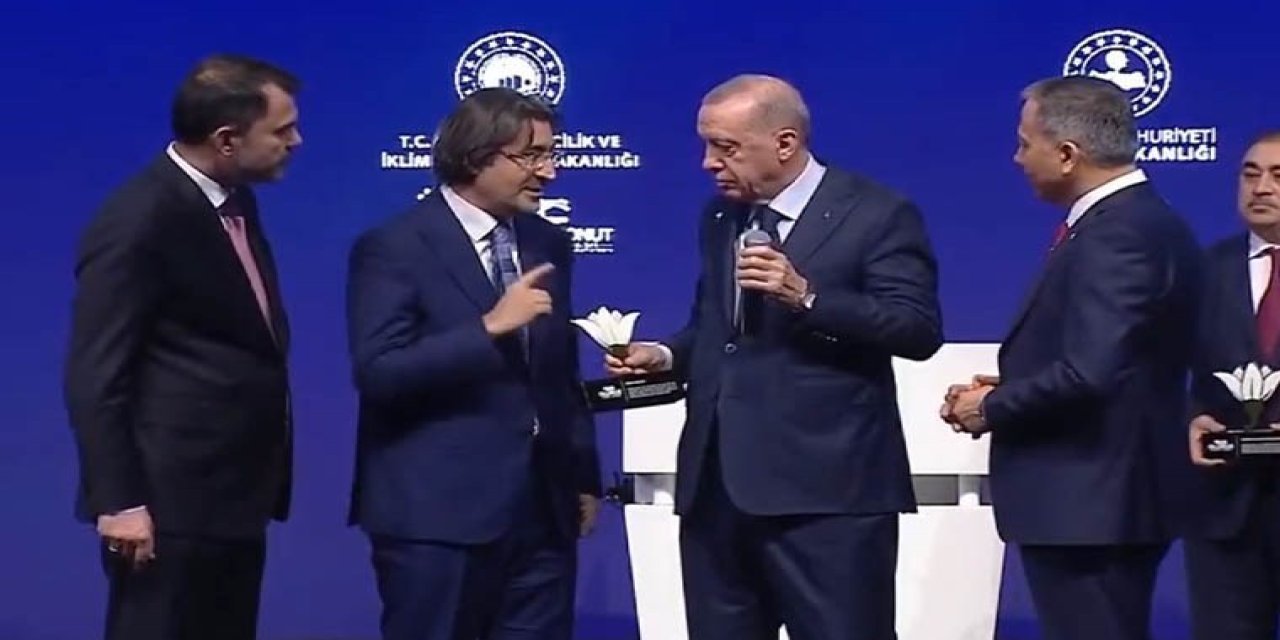SHOCKING Claims: Ziraat Bankası Chief Declares, "I'm the Biggest Philanthropist!" But Erdoğan Responds: "No, the State Gave!"
Yayınlanma Tarihi: 2/7/2025, 7:55:08 PM1. Ziraat Bankası Genel Müdürü Alpaslan Çakar claimed to be the "biggest philanthropist" during a commemoration event for the second anniversary of the February 6 earthquakes in Turkey.
2. President Recep Tayyip Erdoğan responded to Çakar's claim by stating, “You, as a state bank official, should not say you gave, the state gave!”
3. The exchange between Çakar and Erdoğan raised questions about accountability and the role of state institutions in charitable efforts.
4. Erdoğan emphasized that the collective power of the state and the people's money drives aid initiatives, rather than individual contributions from bank officials.
5. The incident highlights the crucial role of state banks like Ziraat in channeling public funds for disaster relief.
6. Concerns were raised regarding transparency and ethical standards when bank officials seek personal recognition for contributions.
7. Public reaction to the incident is mixed, with some supporting Çakar's enthusiasm and others crediting state institutions and citizens for aid efforts.
8. Hashtags like #StateHelpAboveAll have trended on social media in response to the controversy.
9. Experts suggest that the scandal could deter future contributions for disaster response if banking sector individuals are seen as seeking personal recognition.
10. The situation serves as a reminder that unity and cooperation are essential in times of crisis for recovery and rebuilding efforts.
In a jaw-dropping moment that stirred up Turkey's financial and political landscape, Ziraat Bankası Genel Müdürü Alpaslan Çakar declared himself as the "biggest philanthropist" during a commemoration event for the second anniversary of the devastating February 6 earthquakes. His bold claim about charitable contributions to disaster relief sparked a fierce response from none other than President Recep Tayyip Erdoğan. “Leave it to the state,” Erdoğan insisted. The tension between Çakar and Erdoğan has left many wondering: What does this mean for Turkey's bank and disaster relief efforts? Let's dive into the controversy!
What Happened? The Context Behind the Outburst
During an event in Adıyaman, where the country came together to remember the victims of the catastrophic earthquakes, Çakar took the stage and claimed, “I'm the biggest philanthropist; I contributed the most money!” This declaration, which seemed to position him as a hero, was quickly contested by Erdoğan. The President bluntly countered, “Koskoca devlet bankası, bırak sen. Ben verdim deme devlet verdi,” which translates to “You, as a state bank official, should not say you gave, the state gave!” This fiery exchange raises critical questions about accountability and the role of state institutions in charitable efforts.
Why This Matters: The Political Implications
The fallout from this event is significant. It highlights the often-blurry lines between individual contributions and state-funded initiatives. Erdoğan's comments emphasize that while bank leaders may be the public faces of funds and contributions, it is ultimately the collective power of the state—and the people's money—that drives aid initiatives. But will this controversy affect Ziraat Bankası’s operations and its relationship with the government? It certainly has the potential to shift the narrative around who deserves credit in disaster relief efforts.
The Role of State Banks in Crisis Aid
The debate surrounding Çakar’s comments amplifies an essential question: What is the role of state banks in crisis situations? State banks like Ziraat play a crucial role by channeling public funds to support people affected by calamities. However, when a bank official attempts to take too much credit, it raises eyebrows regarding transparency and ethical standards.
How Are State Funds Managed?
The intricacies of managing public funds can often lead to misunderstandings. State banks are essentially vehicles for public monetary policy and disaster management strategies. Therefore, contributions labeled as 'personal' by bank officials should be examined rigorously to ensure that they represent genuine philanthropic efforts rather than political posturing.
Public Reaction: Are Citizens Buying It?
Public sentiment about the whole debacle is mixed. Some applaud Çakar's enthusiasm and commitment, while others feel that the real credit lies with state institutions and the citizens who contribute to aid programs. Many have taken to social media to express their feelings, with hashtags like #StateHelpAboveAll trending.
What Do Experts Say?
Financial analysts and political commentators suggest that this scandal could deter future efforts to mobilize contributions for disaster response and recovery. If individuals within the banking sector are perceived as vying for personal recognition over collective invention, it could lead to a reluctance in future funding initiatives.
Conclusion: The Message Is Clear—Unity Is Key!
What does this situation teach us? It’s an eloquent reminder that in times of crisis, unity and cooperation are paramount. As disasters strike, it’s the collective efforts of state institutions, private sectors, and citizens that ultimately lead to recovery and rebuilding. So next time a bank leader declares his philanthropic pride, remember: It’s the unity of the state and its people that truly drives change.
Call to Action:
Curious about how state banking influences Turkey's economy and disaster relief? Stay tuned for further updates and insights. Your voice matters! Share your thoughts on this issue in the comments below—do you think state or individual contributions should take the spotlight?
Don't forget to explore more thrilling stories on our site! The world of finance is more unpredictable than you think!
Sayfa bulunamadı - Haber Global...
3 months ago
Sayfa bulunamadı - EKOTÜRK...
3 months ago

Ziraat Bankası Genel Müdürü ile Erdoğan arasında dikkat çeke...
NaN seconds ago

Erdoğan'dan Ziraat Bankası Genel Müdürü'ne: Ben verdim deme,...
3 months ago

Cumhurbaşkanı Erdoğan'dan Ziraat Bankası Genel Müdürü'ne dik...
3 months ago

Ziraat Bankası Genel Müdürü Çakar “En büyük hayırsever benim...
3 months ago